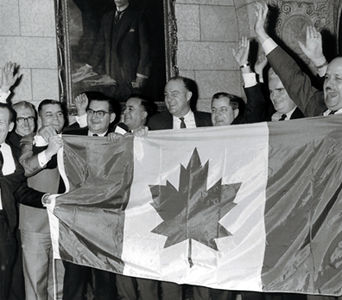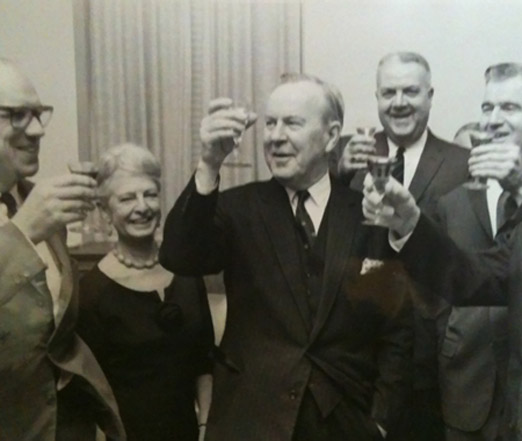“Hard to think of a stance that would go a longer way to reconnect the federal Liberals … ” – guess what it is?
Oct 6th, 2012 | By Counterweights Editors | Category: In BriefAs a kind of coda, footnote, or l’envoi to various recent postings on this site (including the October 4 tribute to the late great Charles Roach), we’d just like to offer a quick thumbs up to a provocative passage in Chantal Hébert’s October 5 column in the Toronto Star, “Here’s how the Liberals can make the old new again.”
The passage we have in mind takes up a mere four sentences: “It is mostly in the margins that political branding is most effective these days and the Conservatives have proven particularly adept on that front … In the process, they have turned their party into a monarchist vehicle … But who speaks for the growing legions of Canadians who have no British roots and no inclination to see their country as a natural part of the anglophile compact that so recently spearheaded the misguided war on Iraq? … It is hard to think of a stance that would go a longer way to reconnect the federal Liberals with Quebec and with many of the constituencies that make up the New Canada than the offer of a strong post-monarchy vision of the country.”
Some with especially good memories may say that the federal Liberals had a chance to take up this quest at their biennial convention in Ottawa this past January, and blew it. Yet everyone makes mistakes, and they can always be corrected.
As the autumn leaves start to fall, we would only add two quick further thoughts to Ms. Hébert’s apt and admirable four sentences.
The first is that, in our experience flogging similar arguments, along with “Quebec and with many of the constituencies that make up the New Canada,” more than a few Canadians who still suffer from old “British roots” of one sort or another also warm to “a strong post-monarchy vision of the country.”
A second thought is that, in our experience again, more than a few Canadians today see the quest for a strong post-monarchy vision of the country as a natural descendant of the ultimately successful quest for an independent Canadian flag in the 1950s and 1960s. In a “Statement by [Interim] Liberal Leader Bob Rae on National Flag of Canada Day” this past February 15, Mr. Rae declared. “I would like to salute the determined leadership of Lester B. [“Mike”] Pearson during the flag debate.” We would just end here by quickly pointing to our own related ramblings of some two and a half years ago, in “Remember when Mike Pearson said ‘I hope Canada will become a republic’ …”




Fascinating idea, it would definetly distinguish them from the conservatives if not from the MDP. To extend your idea further you could see the 1982 constitution as another step away from full monarchy. Where the father took one step could the son take another?
The only problem I see with this is that in pushing to move past the.monarchy the liberals would risk losing their real hope of tearing old progressive conservative, promonarchists like andrew coyness et al who could bring them back to being a viable centrist party. And the liberals kind of tend to like the monarchy, it would be a tricky game to play, but its definitely worth discussing.
The problem you aptly point to Mark is no doubt a real one, and I think it played a big role in convincing the majority at the 2012 convention in January not to back the Young Liberal post-monarchy policy resolution.
At the same time, I wonder myself if the number of voters that Andrew Coyne etc and the monarchist progressive conservatives might bring is anything like the number of voters that would be brought by a restoration of the old Pierre Trudeau constituency in Quebec (almost all the federal seats in the province, despite the widespread political-class talk of anti-Trudeau feeling there).
The Liberals used to be the natural governing party because they alone commanded a significant presence in Quebec, from the days of Wilfrid Laurier on. And personally I can’t for the life of me understand how anyone can imagine that Quebec today and in the future will ever develop any kind of revived interest in the Canadian future, so long as the British monarchy in Canada remains intact.
I think you’re right too Mark that today many “liberals kind of tend to like the monarchy.” And to me this just all too sadly shows how far the party of 2012 has drifted from its real Canadian heroic age, that brought us the first Canadian Citizenship Act of 1947, the Canadian flag of 1965, and (as you also nicely note) the Constitution Act, 1982.